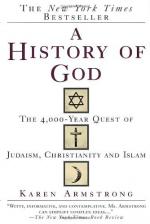|
This section contains 321 words (approx. 1 page at 400 words per page) |

|
A History of God: The 4000-year Quest of Judaism, Christianity, and Islam Summary & Study Guide Description
A History of God: The 4000-year Quest of Judaism, Christianity, and Islam Summary & Study Guide includes comprehensive information and analysis to help you understand the book. This study guide contains the following sections:
This detailed literature summary also contains Topics for Discussion and a Free Quiz on A History of God: The 4000-year Quest of Judaism, Christianity, and Islam by Karen Armstrong.
As a former Roman Catholic nun and now a college teacher for the Study of Judaism and the Training of Rabbis and recipient of the 1999 Muslim Public Affairs Council Media Award, Karen Armstrong has unique qualifications to author the book "A HISTORY OF GOD, THE 4000 - YEAR QUEST OF JUDAISM, CHRISTIANITY AND ISLAM." In the her book, Armstrong traces the evolution of the concept of God from the moment the Hebrew tribes merged in ancient Canaan to form the nation of Israel, through the emergence of Christianity and then the advent of Islam with the teachings of the Prophet Muhammad.
This, in turn, leads to the development of these religions throughout the history of Europe and the Middle East, as the Muslim empire expanded across into Spain, and the Jewish Diaspora promulgated the different branches of Judaism throughout the region. The Christian religion splintered into different sects when the Reformation and the Puritan ethic extended from Cromwell's England to the New World colonies in America where Charismatic Christianity was born.
Karen Armstrong deals with all the different facets of the monotheistic religions and the cross cultural currents in each religion, as Judaism and Christianity were influenced by Greek philosophy, and the coming of the mystics reinforced concepts derived from the Eastern religion of Buddhism.
In the last two chapters Karen Armstrong deals with the emergence of atheism and the secularizing effect of the scientific revolution which occurred when leading writers, such as Nietzsche declared "God is Dead." She points out that the concept of God represents a deep-seated human need, which has existed from time immemorial and that the emergence of so called fundamental movements in all three monotheistic religions, represents a regressive development. Although the exact future of God is unclear, Karen Armstrong points to a religion based on compassion as being the avenue to the creation of a vibrant new faith for the twenty-first century.
Read more from the Study Guide
|
This section contains 321 words (approx. 1 page at 400 words per page) |

|



